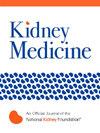NephSIM Nephrons 的初步成果:培养肾脏病学兴趣的虚拟导师计划
IF 3.2
Q1 UROLOGY & NEPHROLOGY
引用次数: 0
摘要
背景尽管肾脏病学界通过大量免费开放的医学教育工具和各国肾脏病学会的努力提高了肾脏病学教育的质量,但人们对肾脏病学的兴趣大多仍然停滞不前。方法2021年1月启动了一项为期6个月的虚拟学习和指导计划(NephSIM Nephrons),以提高医学生和住院医师对肾脏病学职业的兴趣。受训人员被指派一名教师导师,并与教师和其他受训人员组成一个小组。学习机会包括现场和虚拟课程以及异步课程。每年项目结束时,都会通过在线匿名调查收集学员的反馈意见。结果 2021 年和 2022 年项目分别收到 319 份和 315 份符合条件的申请,其中分别有 111 名和 108 名学员被录取;2023 年学员中有 31 人完成了结业调查(回复率:31/84,37%),他们对 NephSIM 尼普龙项目总体体验的平均评分为 4.7 分(满分为 5 分)。所有受访者都表示很有可能或有点可能向其他学员推荐这次经历。在 2021 年和 2022 年两批学员中,有资格在 2024 年 7 月之前匹配到成人或儿科肾脏病研究员职位的学员分别为 49 人中的 37 人(77%)和 38 人中的 29 人(76%)。同样,在 2021 年和 2022 年的学员中,分别有 19 人中的 11 人(58%)和 23 人中的 21 人(91%)能在 2024 年 7 月成功匹配为内科或儿科住院医师。尽管肾脏病学界通过大量免费、开放的医学教育工具和各国肾脏病学协会的努力来提高肾脏病学教育的质量,但人们对肾脏病学的兴趣却始终停滞不前。2021 年 1 月,一项为期 6 个月的虚拟学习和指导计划(NephSIM Nephrons)启动,旨在提高医学生和住院医师对肾脏病学职业的兴趣。对 NephSIM Nephrons 计划的早期成果分析表明,该计划取得了可喜的成果,参与该计划的个人在肾脏病学专业住院医师和肾脏病学研究员中的入学率很高。我们还需要做更多的工作,继续对项目参与者进行严格的跟踪,获得项目的定性反馈,并提高参与者和导师的参与度。本文章由计算机程序翻译,如有差异,请以英文原文为准。
Preliminary Outcomes of NephSIM Nephrons: A Virtual Mentorship Program to Foster Interest in Nephrology
Background
Despite concerted efforts by the nephrology community to increase the quality of nephrology education via a plethora of free open access medical education tools and efforts by national nephrology societies, interest in nephrology has mostly remained stagnant.
Methods
A 6-month virtual learning and mentoring program (NephSIM Nephrons) was launched in January 2021 to increase interest in nephrology careers among medical students and residents. Trainees were assigned one faculty mentor and a small group with faculty and other trainees. Learning opportunities consisted of both live and virtual sessions and an asynchronous curriculum. Feedback was collected from trainees at the end of the program each year through an online, anonymous survey. For trainees in the 2021 and 2022 cohort, residency/fellowship status for the July 2024-2025 academic year was assessed by survey.
Results
Of 319 and 315 eligible applications received for the 2021 and 2022 programs, 111 and 108 trainees were accepted, respectively; 31 participants in the 2023 cohort completed the exit survey (response rate: 31/84, 37%) and rated the mean overall NephSIM Nephrons experience as 4.7 of 5. All respondents were very likely or somewhat likely to recommend the experience to other trainees. In the 2021 and 2022 cohorts, 37 of 49 (77%) and 29 of 38 (76%) trainees, respectively, who were eligible to match into adult or pediatric nephrology fellowships by July 2024 successfully matched. Similarly, among the 2021 and 2022 cohorts, 11 of 19 (58%) and 21 of 23 (91%), respectively, who could be internal medicine or pediatrics residents in July 2024 successfully matched.
Limitations
Low survey response rate.
Conclusions
Early outcome analysis of the NephSIM Nephrons program shows promising results, and individuals who participated had high rates of enrollment in nephrology pipeline residencies and nephrology fellowships. More work is needed to first continue rigorous follow-up of program participants, obtain qualitative program feedback, and improve participant and mentor engagement.
Plain-Language Summary
Despite concerted efforts by the nephrology community to increase the quality of nephrology education via a plethora of free, open access medical education tools and efforts by national nephrology societies, interest in nephrology has mostly remained stagnant. A 6-month virtual learning and mentoring program (NephSIM Nephrons) was launched in January 2021 to increase interest in nephrology careers among medical students and residents. Early outcome analysis of the NephSIM Nephrons program shows promising results, and individuals who participated had high rates of enrollment in nephrology pipeline residencies and nephrology fellowships. More work is needed to continue rigorous follow-up of program participants, obtain qualitative program feedback, and improve participant and mentor engagement.
求助全文
通过发布文献求助,成功后即可免费获取论文全文。
去求助

 求助内容:
求助内容: 应助结果提醒方式:
应助结果提醒方式:


